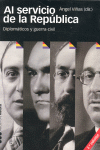Book Review: War on the diplomatic front
 Al servicio de la República. Diplomáticos y guerra civil. Edited by Ángel Viñas. Madrid: Marcial Pons, 2010.
Al servicio de la República. Diplomáticos y guerra civil. Edited by Ángel Viñas. Madrid: Marcial Pons, 2010.
Diplomats are funny creatures. On the one hand, they embody an anachronistic kind of superficiality—all form, protocol, and etiquette. On the other, they are influential actors behind the scenes, no less devious or powerful than spies and secret agents. As the Wikileaks affair reminds us, diplomats function as their nations’ eyes and ears, helping governments read the situation on the ground, but they also work as lobbyists, striking deals and applying pressure. It was in this proactive capacity that the Spanish Republic desperately needed its full diplomatic corps when, in the summer of 1936, the democratically elected Popular Front government was confronted with a coup that quickly developed into a full-blown Civil War. Foreign governments, particularly fellow democracies, needed to be convinced that it was in their best interest—not to mention their moral duty—to stand by the beleaguered Spanish people. But there was a problem: the majority of Spanish diplomats almost immediately sided with the rebels.
How and why this happened, and precisely how the Republican leadership reacted to this massive defection, is the subject of this compelling new collection. Its nine chapters and extensive appendices provide a general overview of the Republic’s diplomatic efforts during the Civil War, while dealing in detail with the embassies and consulates in the Soviet Union (Ángel Viñas), the United Kingdom (Enrique Moradiellos), France (Ricardo Miralles), the United States (Soledad Fox), Switzerland (Elena Rodríguez Ballano), Mexico (Abdón Mateos), and Czechoslovakia (Matilde Eiroa). The collection is edited by Viñas, a prolific Spanish historian of the Republic and the Civil War, whose combativeness and rigor honor the legacy of the legendary Herbert Southworth, his friend and mentor.
Julio Aróstegui’s opening chapter shows that notions of loyalty and betrayal were absolutely central to the justification of individual actions, as well as to the Republic’s attempt to shore up its legitimacy within and outside of Spain. In the second chapter, Viñas gives a thorough overview of the Republic’s foreign policy efforts, taking advantage of the opportunity to debunk the host of myths, exaggerations, and untruths that continue to mar much of the existing work on the topic. Viñas insists on the need for rigorous research based on primary evidence from the time period, the increasing availability of which is allowing for a much more nuanced and complete picture of “what actually happened and, especially, why it happened.” Contrary to what right-wing historians claim, for instance, we can safely say that the Civil War did not safeguard Spain from a descent into social revolution or from falling prey to Stalin. It is by now also clear that, given the support the military rebellion received from Hitler and Mussolini, it should be considered part and parcel of interwar European power politics. More important, Viñas states that it is appropriate to see the events in Spain as the result of a betrayal. “[T]he Spain that struggled to break the shackles of social and cultural underdevelopment,” he states, was betrayed by fellow states (France, Britain, the United States) pursuing “a savage policy of protection of national self-interest, seasoned with ideological, political, and class connotations, and skewed by mistaken or prejudiced analyses of Spanish reality.”
Of special interest to American readers is Soledad Fox’s chapter on Spanish Ambassador Fernando de los Ríos, the affable and sophisticated law professor who spent all three years of the war in Washington, DC. Fox describes in fascinating detail why De los Ríos’ job was a “mission impossible.” While De los Ríos was successful in moving American public opinion to the side of the Republic and requesting that Congress lift the embargo that made it impossible for the Republic to purchase American arms—and while he had many friendly and less-than-friendly meetings with high-ups in the White House—in the end it didn’t matter: Roosevelt was simply too concerned with losing the Catholic vote to change his official stance of neutrality. In hindsight it is difficult not to see De los Ríos steadfast optimism that the U.S. would come to its moral and political senses as a form of self-delusion. Among De los Ríos’ few successes is the permission he secured in 1937 for Dr. Edward Barsky’s medical mission to travel to Spain.
The main conclusion to be drawn from this book is that the Republican diplomats did what they could, but the odds were against them. Their difficult job was further complicated by mixed signals from the divided Republican home front, some of whose foreign-policy initiatives were conducted without the diplomats’ knowledge. In the end, the Republican diplomats were as impotent as their leaders. If recent research has made anything clear, it is that the governments of the countries that mattered—Britain, the United States, France, and the Soviet Union—were, from the outset, unwilling to let any moral or long-term strategic considerations impinge on the short-term, selfish interests that spelled the Republic’s doom, paving the way for the destruction of World War II.
Sebastiaan Faber, chair of the ALBA Board, is professor of Spanish literature at Oberlin College.












